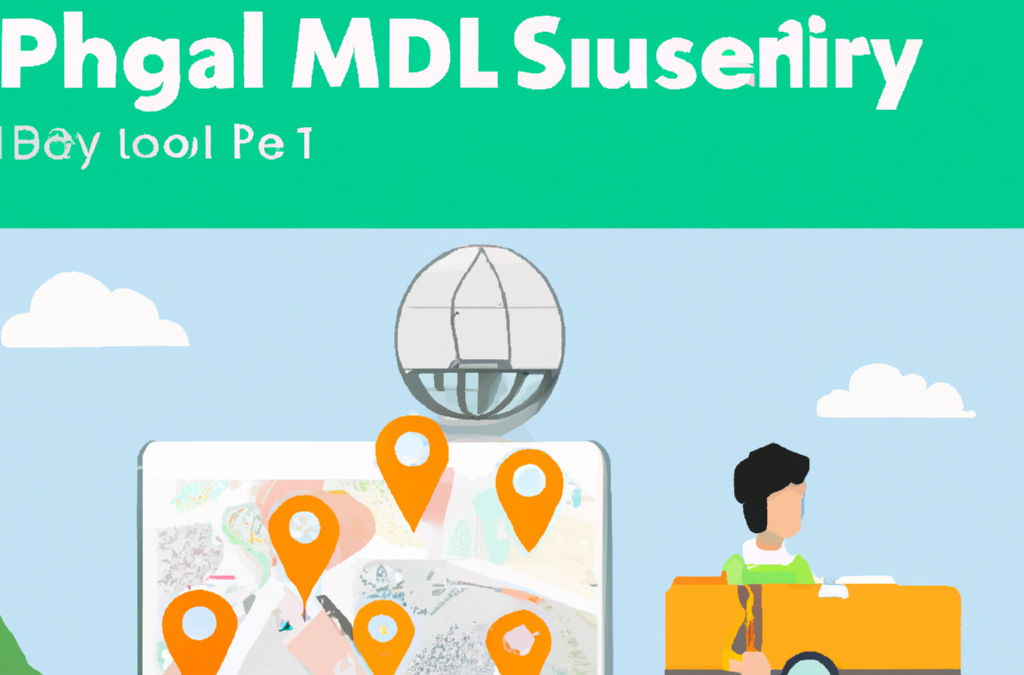In “Dominate the Local Market: Implementing Local SEO for Dentists,” you will discover the valuable strategies dentists and orthodontists can utilize to boost their online presence and attract more local patients. By targeting specific keywords and optimizing their websites for local searches, dental professionals can stay ahead of the competition and establish themselves as trusted experts in their community. This article will delve into the importance of local SEO for dentists and provide actionable tips to help you maximize your visibility in online searches. Whether you’re a dentist looking to enhance your digital marketing efforts or a dental SEO agency seeking to attract dental clients, this article is your go-to guide.
Understanding Local SEO

Definition of Local SEO
Local SEO, or Local Search Engine Optimization, is a digital marketing strategy that focuses on increasing the online visibility and presence of local businesses, specifically targeting potential customers in a particular geographical area. It involves optimizing a website and its online presence to rank higher in local search results, ensuring that nearby customers can easily find and engage with the business.
Importance of Local SEO for Dentists
For dentists, implementing a robust Local SEO strategy is crucial for attracting and retaining local patients. With the majority of people turning to search engines to find healthcare providers, including dentists, it is essential for dental practices to appear prominently in local search results. By optimizing their online presence using Local SEO tactics, dentists can increase their visibility to potential patients in their area, resulting in higher website traffic, more appointments booked, and ultimately, a thriving dental practice.
Key differences between Local SEO and Traditional SEO
While Local SEO shares some similarities with traditional SEO (Search Engine Optimization), there are key differences to consider when implementing a Local SEO strategy for dentists. Traditional SEO aims to increase overall organic search visibility and attract a broader audience, independent of geographical location. On the other hand, Local SEO specifically targets local customers and focuses on optimizing the website and online presence for local searches. Additionally, Local SEO emphasizes the importance of local citations, accurate NAP (Name, Address, Phone Number) data, and leveraging location-specific keywords.
Creating a Solid Foundation
Claiming and Optimizing Google My Business Listing
One of the first steps in building a strong Local SEO foundation for dentists is claiming and optimizing their Google My Business (GMB) listing. GMB is a free platform provided by Google that allows businesses to manage their online presence on Google Search and Google Maps. Dentists can claim their GMB listing and ensure that all relevant information, including their address, phone number, business hours, and services offered, is complete and accurate. Optimizing the GMB listing with high-quality photos, relevant categories, and compelling descriptions can further enhance visibility in local search results.

Optimizing NAP (Name, Address, Phone Number) Data
Consistency and accuracy in NAP data across all online platforms and directories are crucial for Local SEO success. Dentists should ensure that their business name, address, and phone number are consistently listed across various online directories, including their website, social media profiles, and third-party review sites. Any inconsistencies in NAP data can adversely affect local search rankings and lead to confusion among potential patients. Implementing schema markup, a code that helps search engines understand and display the business information accurately, can also contribute to improved local search visibility.
Implementing Schema Markup
Schema markup is a form of microdata that can be added to a website’s code to provide additional context and information to search engines. By implementing schema markup, dentists can enhance their Local SEO efforts by helping search engines understand and interpret important details about their dental practice. This can include information such as business hours, reviews, accepted insurance providers, and specific dental services offered. By providing search engines with this structured data, dentists can increase the likelihood of their website appearing in informative search results, known as rich snippets, which can significantly improve click-through rates and visibility.
Keyword Research and Optimization
Determining Relevant Local Keywords
Keyword research is a critical component of any SEO strategy, including Local SEO for dentists. Dentists should focus on identifying and targeting relevant local keywords that potential patients are using when searching for dental services in their area. This could include keywords such as “dentist in [city]”, “orthodontist near me”, or “dental implants [city]”. Tools like Google Keyword Planner or other keyword research tools can help dentists discover popular and relevant local keywords to optimize their website content effectively.
Optimizing Website Content with Local Keywords
Once dentists have identified relevant local keywords, it is essential to incorporate them strategically throughout their website content. This includes optimizing page titles, headlines, meta descriptions, and body content with the identified keywords. Dentists should ensure that their website provides valuable and informative content while incorporating the keywords naturally, avoiding keyword stuffing. By focusing on local keywords, dentists can improve their chances of appearing in local search results when potential patients search for dental services in their area.

Utilizing Long-Tail Keywords for Local SEO
In addition to targeting broader local keywords, dentists should also consider incorporating long-tail keywords in their Local SEO strategy. Long-tail keywords are longer, more specific phrases that potential patients might use when searching for a particular dental service. For example, “best pediatric dentist in [city]” or “affordable orthodontist for braces in [city]”. By including these long-tail keywords in website content, dentists can attract highly targeted traffic and increase the chances of converting potential patients into actual appointments.
Developing Local Citations
Understanding the Role of Citations in Local SEO
A citation refers to any online mention of a business’s NAP data on external websites, directories, or review platforms. Citations play a vital role in Local SEO for dentists as they help search engines verify the accuracy and legitimacy of a business’s information. The quantity, quality, and consistency of citations across various platforms contribute to the overall trustworthiness and authority of a dental practice’s online presence. Dentists should actively seek opportunities to build citations on reputable directories and platforms, boosting their visibility in local search results.
Choosing the Right Citation Sources
When building citations, it is important for dentists to select the right citation sources that are relevant to their industry and location. For dental practices, industry-specific directories like Healthgrades, Vitals, or Zocdoc can be excellent sources to include in their citation-building efforts. Dentists should also consider local directories, chamber of commerce websites, and online business listings specific to their geographical location. It is crucial to ensure that the information provided in these citations is consistent with the NAP data listed on other platforms, including the website and social media profiles.
Consistency and Accuracy in NAP Data across Citations
Consistency and accuracy of NAP data across citations are vital factors influencing Local SEO performance. Dentists must maintain consistency in how their business name, address, and phone number are listed across all citations, including the website, GMB listing, directories, and social media profiles. Inconsistencies, such as variations in abbreviation or misspellings, can confuse search engines and potential patients. Regularly auditing and updating citations to ensure accuracy is essential for maintaining trust and authority in local search rankings.
Online Reviews Management

Importance of Online Reviews for Local SEO
Online reviews play a significant role in dentists’ Local SEO success. Positive reviews not only help attract potential patients but also act as a trust signal for search engines. Dentists with a high number of positive reviews are more likely to rank higher in local search results, as search engines perceive them as trustworthy and reliable. Therefore, it is crucial for dentists to actively manage their online reviews and encourage satisfied patients to leave positive feedback.
Encouraging and Managing Online Reviews for Dentists
Dentists can encourage patients to leave online reviews by providing a seamless and positive experience. They can ask satisfied patients to share their feedback on platforms like Google, Yelp, or Facebook. Dentists should also consider incorporating review requests in their post-appointment emails or include links to review platforms on their website. When managing online reviews, dentists should promptly respond to both positive and negative feedback. Responding to positive reviews shows appreciation and care for patients, while addressing negative reviews demonstrates a commitment to resolving any concerns.
Responding to Reviews to Boost Local Visibility
Engaging with online reviews not only helps dentists build a strong reputation but also improves their local visibility. When responding to reviews, dentists should personalize their responses, addressing the reviewer by name and expressing gratitude for their feedback. It is important to handle any negative reviews professionally and empathetically, offering a solution or an invitation to discuss the issue offline. This demonstrates to potential patients that the dental practice values patient feedback and is committed to providing excellent care, increasing trust and visibility in the local community.
Optimizing for Mobile
The Significance of Mobile Optimization for Local SEO
With the increasing use of smartphones, mobile optimization is crucial for dentists’ Local SEO success. A significant portion of local searches is performed on mobile devices, and search engines prioritize mobile-friendly websites in local search results. By optimizing their websites for mobile devices, dentists can provide a positive user experience, reduce bounce rates, and improve their chances of appearing prominently in local search results for mobile users.

Responsive Website Design and Mobile-Friendly Pages
Dentists should ensure that their websites have a responsive design, adapting to different screen sizes and resolutions. A responsive website design ensures that the website is visually appealing and easy to navigate on both desktops and mobile devices. Additionally, dentists should optimize their web pages for mobile viewing by using legible font sizes, optimizing images for faster load times, and streamlining the user interface to prioritize essential information or actions, such as booking appointments or contacting the dental practice.
Optimizing Page Speed for Mobile Users
Page speed, especially on mobile devices, is a critical factor for both user experience and search engine rankings. Slow-loading websites frustrate users and increase bounce rates, negatively impacting Local SEO performance. Dentists should optimize their website’s page speed by minimizing file sizes, compressing images, leveraging browser caching, and optimizing code. Tools like Google PageSpeed Insights can provide dentists with actionable recommendations to improve their website’s mobile performance and enhance their Local SEO efforts.
Local Link Building Strategies
Understanding the Importance of Local Link Building
Link building plays a significant role in dentists’ Local SEO strategies by signaling authority and trustworthiness to search engines. Local link building involves acquiring high-quality inbound links from other websites that are relevant to the dental industry or local community. These links can come from reputable dental associations, local businesses, or other relevant websites, all of which help establish a dental practice as a trusted and authoritative source in the local area.
Securing Local Backlinks from Dental Associations
Dental associations, such as the American Dental Association (ADA) or local dental societies, can be excellent sources for securing local backlinks. Dentists can collaborate with these associations by contributing informative articles, participating in community events, or sponsoring dental health initiatives. This not only enhances a dental practice’s credibility but also increases the chances of earning valuable backlinks from associations’ websites, boosting local search visibility.
Guest Blogging on Local Orthodontic Websites
Another effective strategy for local link building is guest blogging on local orthodontic websites or other relevant dental blogs. Dentists can offer to write informative articles or provide expert insights on topics related to dentistry or oral health. By contributing valuable content to these websites, dentists can establish themselves as authorities in the local dental community and earn backlinks to their website. These backlinks contribute to improved local search rankings and drive targeted traffic to the dental practice’s website.
Social Media for Local Dentists
Creating and Optimizing Social Media Profiles
Social media platforms offer a valuable channel for dentists to engage with their local audience and enhance their Local SEO efforts. Dentists should create and optimize their social media profiles on platforms that are popular amongst their target audience, such as Facebook, Instagram, and Twitter. It is essential to include accurate and consistent NAP data on these profiles and ensure that the visual branding aligns with the dental practice’s website and offline presence.
Engaging with Local Audience through Social Media
To maximize the impact of social media for Local SEO, dentists should actively engage with their local audience. This can include posting relevant and informative content, responding to comments or messages promptly, and sharing engaging updates about the dental practice. Dentists can encourage patients to follow their social media profiles by including social media icons and links on their website, in email signatures, or in waiting room materials. By building an active and engaged local following, dentists can increase brand visibility and attract potential patients.
Using Social Media for Promotions and Contests
Social media platforms provide dentists with an opportunity to run promotions, contests, or exclusive offers to attract local patients. By showcasing special promotions or hosting social media-exclusive contests, dentists can generate buzz and incentivize potential patients to engage with their dental practice. Dentists should ensure that these promotions align with any legal or regulatory requirements and include clear instructions on how patients can participate or redeem offers. This not only helps boost local visibility but also encourages social media users to share the promotions, increasing brand exposure.
Tracking and Measuring Local SEO Success
Setting Up Google Analytics for Local SEO
Tracking and measuring the success of Local SEO efforts is essential for dentists to optimize their strategies and identify areas for improvement. Dentists should set up Google Analytics, a free web analytics tool provided by Google, to gather data and insights about their website’s performance. By installing the Google Analytics tracking code on their website, dentists can track key metrics such as website traffic, user behavior, and conversion rates, allowing them to make data-driven decisions and monitor the impact of their Local SEO strategies.
Evaluating Key Local SEO Metrics
To evaluate the effectiveness of their Local SEO efforts, dentists should focus on key metrics that directly impact their local search visibility and website performance. Metrics such as organic search traffic, local search rankings, click-through rates from local search results, and conversion rates from local searches can provide valuable insights into the success of their Local SEO strategy. By regularly monitoring these metrics, dentists can identify trends, spot any potential issues, and make adjustments to their Local SEO tactics if necessary.
Using Google My Business Insights for Performance Tracking
Dentists can leverage the performance tracking features within the Google My Business (GMB) platform to gain insights into how their GMB listing is performing. GMB Insights provide valuable data on metrics such as the number of views the GMB listing receives, how users found the listing (e.g., through direct searches or discovery searches), and the actions users took after viewing the listing (e.g., website visits, phone calls, or direction requests). By analyzing these insights, dentists can understand user behavior and make informed decisions to optimize their GMB listing and overall Local SEO strategy.
Conclusion
Recap of Local SEO Strategies for Dentists
In conclusion, implementing a comprehensive Local SEO strategy is vital for dentists looking to dominate their local market. By focusing on claiming and optimizing their Google My Business listing, optimizing NAP data, utilizing schema markup, conducting keyword research, building local citations, managing online reviews, optimizing for mobile, implementing local link building strategies, and leveraging social media platforms, dentists can significantly increase their visibility in local search results.
Emphasizing the Benefits of Local SEO for Dentists
The benefits of implementing Local SEO strategies for dentists are far-reaching. By appearing prominently in local search results, dentists can attract a steady stream of highly targeted traffic, increase their online and offline visibility, and ultimately convert potential patients into lifelong customers. Local SEO helps dentists build a reputable and authoritative online presence in the local community, enhancing brand awareness and trust.
Actionable Steps to Implement Local SEO for Dentists
Dentists can take action today to implement Local SEO strategies for their dental practice. By following the steps outlined in this article, dentists can claim and optimize their Google My Business listing, optimize NAP data across all online platforms, conduct keyword research and optimize website content, build local citations, actively manage online reviews, optimize their website for mobile, build local backlinks, leverage social media platforms, and track and measure their Local SEO success using analytics tools. By consistently implementing and refining these strategies, dentists can establish themselves as local industry leaders and drive continuous growth for their dental practice.

